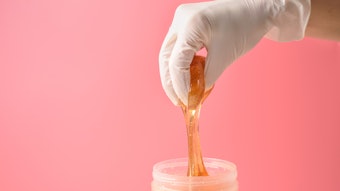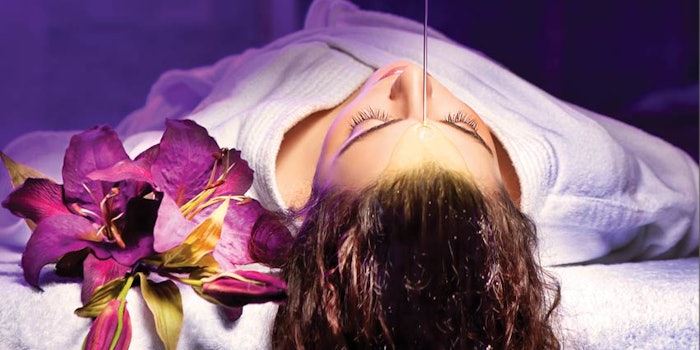
Ayurveda literally means “science of longevity,” with veda meaning knowledge, and ayur meaning longevity. The vedas were handed down by sages over 5,000 years ago and include all aspects of the mind, body and spirit. Ayurveda is a way of life, which includes the way we think, act, feel and relate to our environment.
The Ayurveda philosophy is entirely based on the laws of nature. It believes that all organic living bodies were created from earth. Ayurveda considers man as a miniature replica or small model of the universe. The unity of the macrocosm (world outside) and microcosm (world within) is the most important principle of ayurveda. It is called loka purusha samya, with loka meaning world, purusha meaning man and samya meaning same.
Five Elements
The man and the universe are made up of five basic elements called panchamahabhuta. As shown in Ayurveda’s 5 Elements, they are akasha (ether/space), vayu (air/motion), teja (fire/radiant energy), ap (water/cohesive factor) and prithvi (earth/mass).
The individual (purusha) and the universe (toka) remain in constant interaction with each other. They derive and draw materials from each other to maintain their normality and homeostasis.
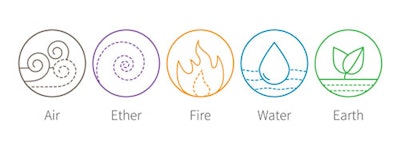
The five elements system from ayurveda are a simple yet profound tool to recognize balance in all aspects of life. By learning this simple system, a person is able to identify the weak and strong points of their individuality to apply its balancing elements to their diet, lifestyle and environment.
In the ayurvedic system, it is these five elements that form the building blocks of life. Everything in the universe is created from a certain ratio of the five elements. By understanding the dominant elements inside a person, substance or environment, we are then able to know what influences will be exerted upon the body and mind. We can then find ways to increase the opposing elements to create balance or more of the desired qualities for that moment.
When in balance, these five elements normally sustain life. When out of balance, they will create discomfort and threaten life. This elemental imbalance in the body will show up as a dysfunctional expression of one of the qualities that are associated with that element.
Ayurveda in the Spa
Ayurvedic medicine can include internal herbal medicine or external medicine such as massage, shirodhara, herbal applications and steaming. Shirodhara and shiro abhyanga are discussed below as two special treatments in the spa, but other ayurvedic treatments can also be found in the spa though nutritional advice, yoga and meditation.
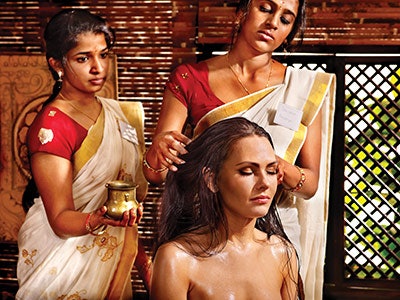
Shirodhara. This treatment uses warm herbal oils, milk or buttermilk, or decoctions that are poured in a slow steady stream on the client’s forehead. Shiro means head and dhara means flow. The steady flow of warm oil onto the forehead stimulates the pituitary gland, or “third eye.” This is one of the most divine therapies, awakening a person’s intuitive knowledge.
This treatment is profoundly relaxing, nourishing and helps to improve a person’s mental clarity and comprehension. It is beneficial in relieving symptoms of anxiety, stress, fatigue and hypertension. It relieves tension, worry, fear and headache as well as depression. It regulates mood and gives feelings of pleasure and relaxation.
Shiro abhyanga. This is one of the best ayurvedic treatments to prevent and treat many psychosomatic illnesses. Shiro means head and abhyanga is massage. Massage techniques are applied for 20 minutes to the head.
This treatment is an effective stress-relieving treatment that provides good strength, freshness and energy, plus helps to improve metabolism, circulation and nerve conduction.
Ayurveda and Cancer
Cancer is called arbuda in ayurveda and karkatar arbuda when it is malignant. The cause of all diseases, according to ayurveda, is mostly due to toxins collected in our body. Some research has found some types of ayurvedic treatments can help to relieve cancer symptoms and improve a person’s quality of life.
Before beginning. Clients who present with cancer typically undergo mainstream treatments such as surgery, chemotherapy and radiation therapy. Many people are not offered an option of alternative therapies or an integrative approach where the oncologist (cancer specialist) is open to alternative or complementary treatments as an adjunct treatment. Always remind your client to let their attending physician know what adjuvant therapies they are undertaking so that the physician can check for potential side effects to mainstream treatments like radiation therapy and chemotherapy.
Panchakarma. Ayurveda suggests panchakarma (detoxification) as the first line of treatment for all kinds of illness. This deep-healing treatment includes the use of organic oils that are customized for nourishing and nurturing the client. The practitioner must decide if their patient/client requires tonification or purification therapy to allow prana (life force) to flow freely and to support the healing process. Aromatherapy and healing music or chants are included during the sessions for positive affirmation and to release negative emotional patterns. If the client cannot have panchakarma, then the alternative options are shirodhara and shiro abhyanga primarily for stress reduction and relaxation.
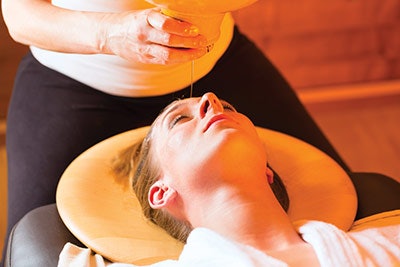
Silence. Caring for the body nurtures the ego, while devotional practices nourish our higher spiritual self. Healing begins with the purification of the mind. Periods of silence and a lack of sensory stimulation are the best methods of purifying the mind, and can then be supported through the use of herbs such as brahmi, tulsi and calamus.
Psychotherapy. Some patients can benefit from traditional Western psychotherapy, which begins the process of self-awareness through exploring and releasing repressed feelings.
Shirodhara and Shiro abhyanga. Most of the body treatments involve using herbal oils for specific ailments like arthritis, sciatica, eczema, psoriasis and more. Ayurvedic spa treatments like shirodhara and shiro abhyanga can help to destress the mind and can be used to treat some of the side effects of cancer care. For example, the pouring of oil for up to 45 minutes, as in shirodhara, may be beneficial for moderate to severe insomnia.1 While massage is beneficial for those with cancer, 20 minutes may be too active for some people. You may perform up to 20 minutes or longer for those in remission and who still have their hair intact.
Rasayanas in facials. Chemotherapy has a tendency to dry or inflame the body internally and externally, resulting in very dry or inflammatory skin on the scalp, face and body. For the client who is undergoing active chemotherapy and for clients who are in remission, all can benefit from soothing, nourishing facial treatments to help the skin’s vitality and also to build healthy tissues. Rasayanas are herbs and minerals that aid in rejuvenating and nourishing.
Herbal scalp services. For clients that experience alopecia from chemotherapy, the following ingredients can be used while offering services for the scalp. A hair oil that is formulated with brahmi, gota kola and valerian helps to reduce stress, anxiety and insomnia.Brahmi’s antioxidant properties help provide nourishment to the scalp and the hair follicle in turn encouraging growth and supporting hair health. A hair oil containing herbs like Psoralea coryfolia encourages hair growth and helps treat hair loss and baldness. A gentle hair cleanser that contains Indian gooseberry and arnica can aid in eliminating scalp irritations and dryness while helping to strengthen the hair. A hair tonic made with triphala, mint and musk mallow is particularly cooling and nourishing to the scalp. It encourages hair growth and aids in thickening the hair.
Physical and Emotional Balance
Spa therapists can use ayurveda to bring balance and harmony into the body resulting in: increased energy and well-being; balance of the mind, body and spirit; and decreased stress. For example, massage can lower stress and help relaxation. Meditation can reduce anxiety, lower blood pressure and boost general well-being. While all types of herbal oil massage are beneficial, daily self-abhyanga (massage with oil) at home is also important. Studies have shown that yoga helps lymphoma patients sleep better and reduces stress in people with breast or prostate cancer.
Ayurvedic medicine practitioners approach their patient/client on several levels of causes; however, it is important to address both physical and emotional issues when working with a client with cancer.
REFERENCES
- www.ncbi.nlm.nih.gov/pmc/articles/PMC3921608/
(Accessed Oct 11, 2017)







